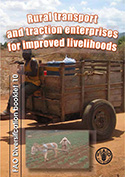Rural transport as a service
One of the main and most popular services that is provided by a hire service is transport. Marketing of farm produce requires mobility to access markets and the sale of farm produce. Mobility provided by a transport service enables more efficient farm operations, access to markets from farm to village and/or from rural to urban areas. It can be a critical support factor in developing and enabling smallholders. Transport is an important requirement for the appropriate functioning of the produce supply chain in terms of, for example, storage, processing, and distribution of food products. Transport operations affect the costs of produce supply chains and the prices of the final food products. It is commonly a major cost component in the produce supply chain
Mobility can also support community development. Transport enables rural populations to move, and to benefit from social and educational interactions, health care and technology transfer. Furthermore, women who commonly carry out much of the burden of farm work – such as weeding the crops, carrying out domestic work, and collecting water collection – can be facilitated and enabled if they have access to transport. It can also improve their access to markets, enable them to become more involved in economic activities and to form networks with other women.
The type of transport services that can be offered by a hire service will depend on animal power and/or the use of motorized power. The many transport options available will differ in ranges, capacities and operating costs.
FAO can provide technical support and backstopping in-country for the development of rural transport services provided by hire services, and for public and non-profit service providers supporting hire services that provide transport services; appraisals and assessment of on farm transport systems, farm to village transport systems, rural to urban transport systems and transport systems along the food value chain; transport service development at the production level, along the food value chain and in organic waste collection and recycling; and appraisals and assessment of business models for transport service development.


